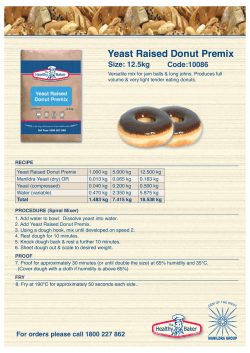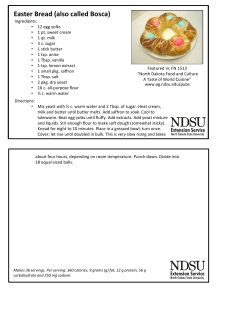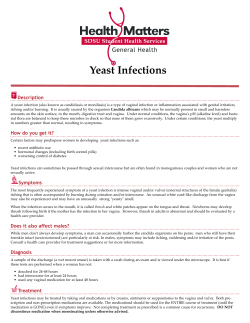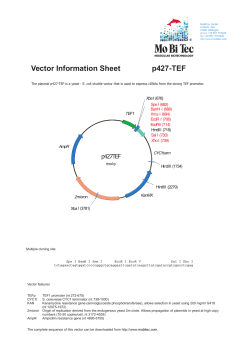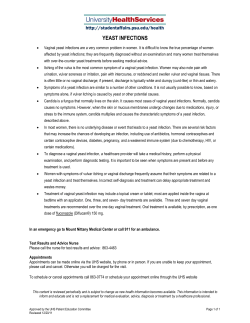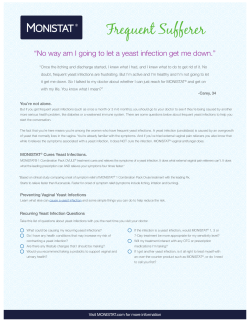
Yeast Knockout Clones and Collections
RNAi, Gene Expression & Gene Editing Yeast Knockout Clones and Collections Cat # YSC1021 YSC1053 YSC4298 YSC4341 YSC4506 YSC1054 YSC4299 YSC4507 YSC1055 Yeast: Yeast Knock Out Strain Yeast MATa Collection Yeast MATa (plates 72-73) Yeast MATa (plate 73) Yeast MATa (plates 74-75) Yeast MATalpha Collection Yeast MATalpha (plates 172-173) Yeast MATalpha (plates 174-175) Yeast Heterozygous Collection YSC4300 YSC4343 YSC4508 YSC4619 YSC1056 YSC4301 YSC4344 YSC4509 YSC1057 Yeast Heterozygous (plates 281-282) Yeast Heterozygous Plate 282 Yeast Heterozygous (plates 283-284) Yeast Heterozygous (plates 285-286) Yeast Homozygous Diploid Collection Yeast Homozygous (plates 69-70) Yeast Homozygous Plate 70 Yeast Homozygous (plates 71-72) Yeast Essential Collection Product Description: A nearly complete set of yeast open reading frame (ORF) knock-outs has been produced by the Saccharomyces Genome Deletion Project (SGDP). A PCR based strategy was used to replace each ORF with a KanMX cassette containing unique tags or barcodes for each deletion. Four different mutant collections have been generated: haploids of mating types MATa and MATalpha, homozygous diploids for non-essential genes, and heterozygous diploids, which contain the essential and non essential ORFs. Shipping and Storage: Individual clones are shipped at room temperature and may be stored for up to one week at + 4 °C. They may be stored indefinitely at -80 °C. Plates are shipped on dry ice and should be stored at -80 °C. To allow any CO2 that may have dissolved into the media from the dry ice in shipping to dissipate, please store plates at -80 °C for at least 48 hours before thawing. Strain Background Genotype Mat A BY4730 MAT a leu2∆0 met15∆0 ura3∆0 Mat Alpha BY4739 MAT alpha leu2∆0 lys2∆0 ura3∆0 Mat A BY4741 MAThis3∆1 leu2∆0 met15∆0 ura3∆0 Mat Alpha BY4742 MAT alpha his3∆1 leu2∆0 lys2∆0 ura3∆0 Het/Hom Dip BY4743 4741/4742 Homozygous diploids are in the BY4743 background unless 4730/4739 is indicated Background strains and genotypes of knockout strains generated by SGDP, including mutant collections.. Obtaining Clone Information: Clone details such as vector information, antibiotic resistance and sequence of insert are available at dharmacon.gelifesciences.com. Clicking on the vector name will open a separate window containing vector properties including antibiotic resistance, vector map and sequence files. Click on the accession associated with the clone to view insert information. An Excel file denoting the plate locations of each particular knock-out strain in the collection can be found at dharmacon.gelifesciences.com. Glycerol Stock Replication: Culture S. cerevisiae in YPD broth + G418 (200 μg/mL). Add 15% glycerol prior to freezing. Replication of Individual Clones: Inoculate the yeast culture into the appropriate liquid media plus antibiotics or supplements (no glycerol) and incubate for at least 48 hours at 30 °C with shaking. After incubation add enough sterile 50/50 glycerol/YPD mixture to bring the total glycerol percentage to 15%. The culture can then be stored indefinitely at -80 °C. GE Healthcare Technical Manual Dharmacon™ Replication of 96-well Plates: Prepare Target Plates 1. Prepare deep well 96-well target plates by dispensing 1.5mL media with appropriate antibiotics. Prepare Source Plates 1. Remove the lids and the aluminum seal from the source plates. Removing the seals while the source plates are frozen will minimize cross-contamination. 2. Allow the source plates to thaw completely with the lids on. Wipe any condensation that may appear under the lids with ethanol and an absorbent wipe. Replicate 1. Gently place a sterile, disposable replicating tool into the source plate and lightly mix the yeast cells. Make sure to scrape the bottom of each well thoroughly ensuring maximum transfer of cells. 2. Gently remove the replicating tool from the source plate and gently insert the tool into the target plate. Mix the replicating tool around in the target plate. 3. Dispose of the plastic replicating tool. 4. Replace the lid of the target plate and the source plate. 5. Repeat steps 1-6 until all plates have been replicated. 6. Heat seal source plates and return to an ultralow freezer. 7. Cover with a microporous film and place the target plates on a 30 °C incubator with shaking for at 16-48 hours, based upon when growth is apparent. 8. When sufficient growth has been noted in the target plates, add 400 µL of 50% glycerol to each well for a final concentration of 12.5% glycerol. 9. Heat seal target plates and return to an ultralow freezer. References: 1. Winzeler, E.A., et al., Functional characterization of the Saccharomyces cerevisiae genome by gene deletion and parallel analysis, Science, 285:901-906, 1999. 2. Giaever, G., et al., Functional profiling of the Saccharomyces cerevisiae genome, Nature 418: 387-391, 2002. 3. Wach, A., Brachat, A., Poehlmann, R. & Philippsen, P., New heterologous modules for classical or PCR-based gene disruptions in Saccharomyces cerevisiae, Yeast 10: 1793-1808, 1994. Yeast Knockout Useful Information: Genotypes http://www-sequence.stanford.edu/group/yeast_deletion_project/faqs.html#strainbkgrds For an explanation of deletion strain confirmation: http://www-sequence.stanford.edu/group/yeast_deletion_project/project_desc.html#delconfirm Strain Verification For each ORF, two independent deletion mutants must be produced. This can be done in one of three ways: 1. Transformation of haploids. The diploids are then obtained by mating. 2. Transformation of diploids. The haploids and homozygous diploids are obtained by sporulation and mating 3. Transformation of one of the haploid strains and the diploid strain. The other haploid strain is obtained from the diploid by sporulation and the homozygous diploid is made by mating of the two haploids. The genotypes of the a and alpha segregants have to match those of BY4741 and BY4742, respectively. Haploid Transformants A-KanB and KanC-D tests must be positive with the deletion mutant and negative with wild-type. If one of these reactions doesn’t work, the A-D* test can substitute. A-B and C-D tests: Both must be negative with the deletion strain and positive with wild-type. Heterozygotes A-B, C-D, A-KanB and KanC-D PCR products must be present. An A-D* test can substitute if either the A-KanB or KanC-D PCR doesn’t work.* Because the sizes of the A-D bands can be similar in wild-type and mutant strains, it can be helpful to digest part of the A-D reaction with HindIII to test for the HindIII site in the KanMX4 cassette Haploid Segregants A-B and C-D products must be present in wild-type but not in the mutant. For at least one deletion-specific primer pair, either an A-KanB, KanC-D, or an A-D band of the expected size must be present. Homozygous Diploids Must be met+lys+, streaked to single colonies, and tested for both mating and sporulation. Link To List Of Deletion Primers On SGDP http://www-sequence.stanford.edu/group/yeast_deletion_project/Deletion_primers_PCR_sizes.txt Helpful Links: Deletion Strategy http://www-sequence.stanford.edu/group/yeast_deletion_project/PCR_strategy.html Deletion Strain Confirmation http://www-sequence.stanford.edu/group/yeast_deletion_project/project_desc.html#delconfirm Strain Verification http://www-sequence.stanford.edu/group/yeast_deletion_project/verification.html Strain Confirmation http://www-sequence.stanford.edu/group/yeast_deletion_project/project_desc.html#delconfirm Kan Cassette Sequence http://www-sequence.stanford.edu/group/yeast_deletion_project/KanMX4.html kanB and kanC Primers http://www-sequence.stanford.edu/group/yeast_deletion_project/kanB_kanC_seq.html KO Specific Primers http://www-sequence.stanford.edu/group/yeast_deletion_project/downloads.html Deletion Primers http://www-sequence.stanford.edu/group/yeast_deletion_project/Deletion_primers_PCR_sizes.txt Genotypes http://www-sequence.stanford.edu/group/yeast_deletion_project/faqs.html#strainbkgrds FAQS/Troubleshooting: For answers to questions that are not addressed here, please email technical support at ts.dharmacon@ge.com GE Healthcare Orders can be placed at: gelifesciences.com/dharmacon Customer Support: cs.dharmacon@ge.com Technical Support: ts.dharmacon@ge.com or 1.800.235.9880; 303.604.9499 if you have any questions. V1-0115 GE, imagination at work and GE monogram are trademarks of General Electric Company. Dharmacon is a trademark of GE Healthcare companies. All other trademarks are the property of General Electric Company or one of its subsidiaries. ©2014 General Electric Company—All rights reserved. Version published August 2014. GE Healthcare UK Limited, Amersham Place, Little Chalfont, Buckinghamshire, HP7 9NA, UK
© Copyright 2025

